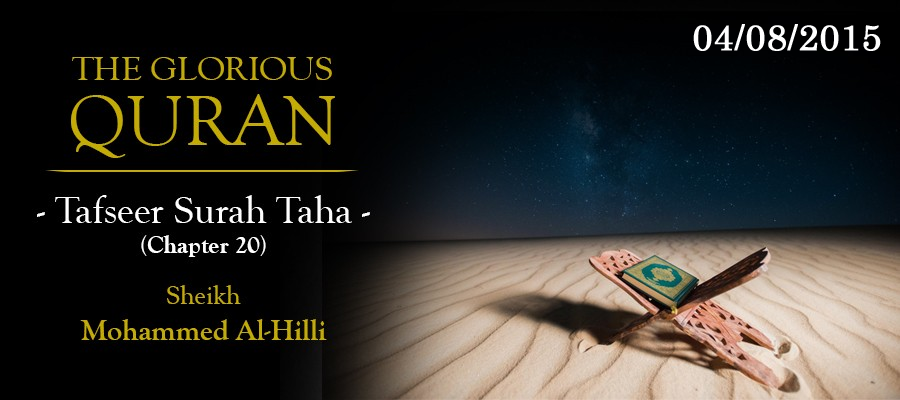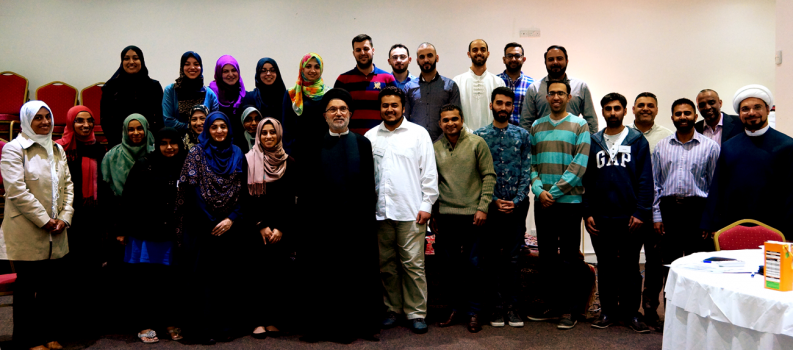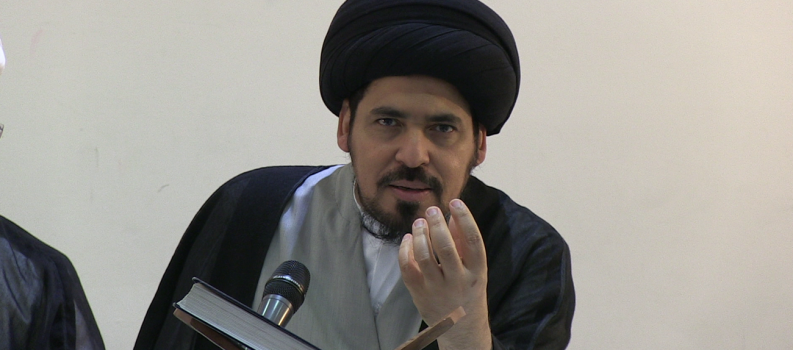
Shaykh Mohammed al-Hilli continued with his tafsīr of Sūrat Ṭā Hā, focusing this week on the verses 40 to 44.
Shaykh Mohammed began by considering how conversation and discourse are natural habits of human beings, and how this dialectic is used throughout the Qur’an. In particular, he focused on a number of exchanges referred to in Sūrat Qāf. On the Day of Judgement wrongdoers who are Hell-bound will try to evade the blame for their transgressions, in response to which we are told: “qāla qarīnuhu rabbanā mā ‘aṭġaytuhu walākin kāna fī ḍalālin ba`īd – his companion will say: ‘Our Lord, I did not make him transgress, rather he was in extreme error himself’” (50:27). To identify who this companion is we can look at another verse from the Qur’an in which the same word meaning companion: qarīn, is used: “waman ya`šu `an δikri al-raḥmāni nuqayyiḍ lahu šayṭānan fahuwa lahu qarīn – and whoever is blinded from the remembrance of the Merciful we shall appoint for him a devil, and he shall be a companion to him” (43:36). As such, the companion referred to in Sūrat Qāf is the devil, and we are told that there will be disputes on the Day of Judgment between sinners and the devils who whispered in their chests. God, however, will not tolerate this, saying “lā taxtaṣimū ladayya – don’t argue before Me” (50:28) and we understand that, regardless of how we feel we may have been influenced, in the end we alone are responsible for our own actions. Another conversation that takes place in Sūrat Qāf is between God and Hell where God tells us: “naqūlu lijahannama hal imtala’ti wataqūlu hal min mazīd – We will say to Hell: ‘Have you been filled?’ and it will say: ‘Are there even more?’” (50:30). Many scholars of our Sunni brothers claim that this conversation takes place when God places His foot into Hell, and asks if it’s full? However, in the school of Ahl al-Bayt we completely reject the idea that God is constrained by any corporeal existence, and interpret the exchange to signify the great number of sinners who will be punished on the Day of Judgment and the limitless expanse of Hellfire.
So, throughout the Qur’an God makes use of conversation to enlighten us and teach us lessons. The conversation we’re focusing on now is the one that takes place between God and Moses in the valley of Ṭuwā. Last week we reached a problematic point at which God says to Moses: “qatalta nafsā – you killed someone” (20:40) and we briefly looked at this story which is related in more detail in Sūrat al-Qaṣaṣ. We are told that one day Moses wandered into the city where the Israelites lived and encountered a fight between someone “min šī`atih – from his followers” and someone “min `aduwwih – from his enemies” (28:15). The one who was from his from his followers called out for help from him, and so Moses struck the one who has from his enemies and, in doing so, killed him. Following this event Moses appears to show remorse. He says “hāδā min `amali al-šayṭān – this is from the work of the Devil” (28:15) and “rabbi ’innī ẓalmtu nafsī faġfir lī – my Lord, I have wronged myself, so forgive me” to which we are told “faġafara lah – so He forgave him” (28:16). Some scholars have taken this incident as evidence for the fallibility of the Prophets and a clear indication that Moses committed a sin. However, there are a number of interpretations put forward by exegetes that counter this claim. The first is that Moses was acting justly, that the man he had killed had acted oppressively and deserved death. We remember, in this instance, how God referred to Pharaoh as “`aduwwun lī wa`aduwwun lah – an enemy to Me and an enemy to him [Moses]” (20:39) and how we interpreted this as an equation of God’s enemies with Moses’s enemies, and how the man Moses killed was referred to as “min `aduwwih – from his enemies”. As such we can interpret that the killed man was one of God’s enemies, a wrongdoer, and Moses, as a prophet, was authorised to mete out divine retribution. A second interpretation is that Moses had no choice in the matter. The word used to describe the fight between the two men is “yaqtatilān – they (two) were fighting” (28:15), the verb “iqtatal” deriving from the root Q-T-L, implying killing and lethal force. Moses, then, was faced with this deadly confrontation between two people and it was incumbent upon him to do all in his power to protect the one who was from his followers who had asked for his help. In this case Moses acted completely in defence and is guiltless of the crime of murder. A final interpretation is that Moses did not mean to kill the man. Encountering the two men fighting and, having been called out to help by one of his followers, he rushed in and struck the man, causing the man to fall and die, without stopping to think his actions through.
Here are three interpretations in which Moses has not committed a sin, but how can we square his subsequent statements? Let’s look at them one by one. First he says “haδa min `amali al-šayṭān – this is from the work of the Devil”. We can understand this as referring not to his actions, but to the fight which had just taken place before him. Next he says: “’inni ẓalamtu nafsī – I have wronged myself”. We should pay particular attention to the fact that he says “ẓalamtu nafsī – I have wrong myself” and not “ẓalamtu rabbī – I have wrong my Lord”. Murder is, of course, a crime against God, since no human being has the right to take away an innocent life. But Moses did not say he had wronged God, only himself, and so was not guilty of having committed a sin. Rather, he is expressing his own dissatisfaction with his actions, of having acted hastily and not taken the time to consider. But what of: “faġfir lī faġafara lah – ‘so forgive me,’ so He forgave him”? In this case, the exegetes tell us that the word “ġafar” meaning “to forgive” is derived from the sense of concealing, and it’s in this original sense that we should interpret the word in this case. As such, Moses is asking God to protect him from the retaliation of the Egyptian authorities by concealing the incident. This correlates with how the story is referred to in Sūrat Ṭā Hā, where God says: “waqatalta nafsan fanajjaynāka min al-ġamm – and you killed someone, so We saved you from retaliation” (20:40).
Following this God tells Moses: “wafatannāka futūnā – and We tried you with a trial” (20:40). Shaykh Mohammed pointed out at this point that the trials God uses to test human beings can be either positive or negative in nature, citing the following verse from Sūrat al-‘Anbiyā’: “wanablūkum bil-šarri wal-xayri fitnah – We test you with bad and good as trials” (21:35). Many people, when faced with trials and tribulations in their lives, ask why they should suffer so. However, many times when we look back, with the benefit of hindsight, at the trials we have faced, we see that they have had a positive impact on our lives. They allow us to gain knowledge of our strengths and our weakness, and give us perspective on our lives, allowing us to become better human beings. So it was with Moses who went through hardship, just as many of our Prophets and Imams, and came out all the better for it. We must remember that Moses was brought up as a prince, living in the lap of luxury in Pharaoh’s palace. Following the incident in which he killed someone he exiles himself to Midian, as God tells him: “falabiθta sinīna fī ‘ahli madyan – and you lived for years with the people of Midian” (20:40), living there as a lowly shepherd. This was Moses’s trial and, being deprived of all the palatial luxury he had become accustomed to, God gave him to the opportunity to demonstrate and manifest his humility. After his years in Midian Moses arrives in the valley of Ṭuwā – “θumma ji’ta `alā qadrin yā mūsā – then you came at the decreed time, oh Moses” (20:40) – and God says to him: “waṣṭana`tuka linafsī – and I produced you for Myself” (20:41). This last phrase is rather difficult and requires a little interpretation. It is possible to translate the phrase as “I produced you to Myself” rather than “for Myself”, since the Arabic prefix “li-” can mean both “to” and “for”. In this sense it emphasises the fact that God had specifically chosen Moses and brought him in particular to Ṭuwā to encounter the burning bush, as opposed to anyone else. However, we can also interpret it as “I produced you for Myself”. In this case we should point out that the verb “iṣṭana`” also has the meaning of “to choose and use (for a purpose)” and as such we can interpret the phrase as meaning “I have chosen and used you for Myself”. But what does it mean for God to use Moses for Himself? The meaning is that God has specific purpose for Moses, that God has produced Moses, not literally for Himself, but for the divine mission that he has given Moses. These different meanings resonate with each other and form a composite interpretation in which God has specifically selected Moses, as opposed to his peers and contemporaries, to carry out the task of confronting Pharaoh. We find correlation for this interpretation in Sūrat Maryam where, of all the Prophets mentioned in that chapter, Moses is the only one who is described as “muxliṣā – chosen” (19:51).
Shaykh Mohammed took a moment to reflect on this word “muxliṣ – chosen”, and to distinguish between “istixlāṣ – selection” and “ixlāṣ – sincerity, devotion”. The one comes from the other. People may ask why it is that Moses was selected to carry out God’s mission and not themselves. The answer is that the door is still open, but before one can gain istixlāṣ one must first attain ixlāṣ. Moses was not chosen arbitrarily to be a Prophet and Messenger of God. In a hadith from Imam Hussain we are told that Moses was chosen because of his exceeding humility, God saying to him “Every time you prayed you placed your cheek on the ground” (Al-Kāfī, vol. 2, Bāb al-Tawāḍu`, hadith 7). We remember now that Moses was brought before the Burning Bush only after he had endured the long years in Midian and demonstrated his humility and his devotion to God regardless of his state of living. God does not choose His servants randomly; rather He chooses them based on their characteristics, and it us up to us to aspire to those levels of sincerity and humility. If we want to be chosen by God then let us prove ourselves worthy of istixlāṣ by demonstrating our ixlāṣ.
So, having concluded His brief summary of Moses’s life God commands Moses once again: “iδhab ‘anta wa’axūka bi’āyātī – go you and your brother with My signs” (20:42). He see here that God has answered Moses’s prayer and given him his brother as a companion. This is further emphasised in the following verse: “iδhabā ‘ilā fir`awna ‘innahu ṭaġā – go [two of you] to Pharaoh for he has transgressed” (20:43). If we compare this to what God said to Moses earlier: “iδhab ‘ilā fir`awna innahu ṭaġā – go to Pharaoh for he has transgressed” (20:24) we notice that these two verses are identical expect that in the earlier one the imperative verb is in the singular “iδhab – you go” and in the later verse it’s in the dual “iδhabā – you two go”. One might ask for a reason for this change. Why not use the dual form from the beginning? Didn’t God know that Aaron would be accompanying Moses from the outset? The answer is of course He did, but here He wants to demonstrate his mercy. He is specifically responding to Moses’s request and allowing him to take his brother with him as a partner in his task. In relation to this we should remember God’s words in Sūrat Ġāfir in which He says: “id`ūnī ‘astajib lakum – call upon Me and I will answer you” (40:60). God will grant you your wishes, but you have to ask for them. Just as when he waited for Moses to ask for Aaron as a companion before giving him, He is waiting for us to call upon him. We should also point out, coming back to verse 42, that God tells Moses and Aaron to go “bi’āyātī – with My signs”. The word “āyāt – signs” is in the plural here, and in Arabic we have three grammatical numbers: singular, dual and plural, which is three or more. So far Moses has only witnessed two of God’s signs, so by using the plural God is telling Moses that there will be more miracles to come (such as the plagues, turning the Nile to blood, splitting the Red Sea) and as such is continuing to reassure him and give him confidence.
Further to this God commands to the two of them “lā taniyā fī δikrī – don’t hesitate in My remembrance” (20:42). We remember Moses’s mother to whom God commanded: “iqδīfīhi fi al-tābūti faqδīfīhi al-yamm – throw him in a casket and throw him in the river” (20:39). The verb used here is “faqaδ” which means “to throw, to cast” and has a strong sense of not hesitating. God is constantly telling us, whether it’s to Moses’s mother or to Moses and Aaron themselves, not to hesitate in carrying out his commands. How many times are we afraid to show our faith? How many times have we avoided saying salām on the phone when in the presence of non-Muslim friends, or have avoided praying out in the open for fear of being judged? This hesitation is from the Devil – God tells us to throw it away, to never be hesitant in His remembrance, just as He commanded Moses and Aaron.
Finally God commands Moses and Aaron to go to Pharaoh and “qūlā lahu qawlan layyinā – speak to him with gentle speech” (20:44). What a stark contrast this is to the poisonous, hateful rhetoric we see nowadays from the likes of ISIS and those who support them. Pharaoh is the greatest oppressor and tyrant of his time, God’s enemy himself. Yet God doesn’t command Moses and Aaron to come down upon him, shouting harsh words of retribution. Instead, he tells them to use gentle speech. This is the true way of Islam. Insha’allah next week we will continue the discussion concerning this issue of tolerance, and will go on to see how Moses engages with Pharaoh as we continue with our tafsīr of Sūrat Ṭā Hā.








